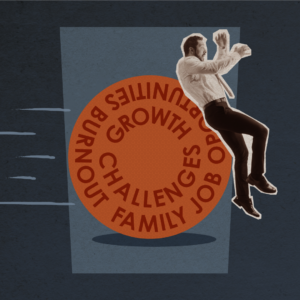Executive recruiters often observe a cyclical pattern in the willingness of employed executives to entertain new job offers. To put this another way: head hunters are always hunting heads, but heads aren’t always looking to be hunted.
“There seems to have been a back and forth on this, since COVID, where the willingness of candidates to entertain new opportunities has expanded and contracted several times,” says Goldbeck Recruiting President Henry Goldbeck. “Currently we seem to be going through a phase where it’s tightening, with candidates being a little bit more reluctant to entertain new opportunities.”1
This phenomenon goes beyond the quality of the job or the attractiveness of the offer itself. Instead, broader economic, societal, and psychological factors play significant roles in shaping this collective mentality.
In this article, we will explore why executives are more open to new opportunities during certain periods and more resistant at other times. We will examine the roles of the economy, societal influences, and individual psychology in this ebb and flow.
Economic Conditions: The Driving Force
Economic conditions are perhaps the most influential factor in determining whether executives are willing to consider new job offers. During times of economic growth and stability, executives feel more confident about exploring new opportunities. A robust economy typically means a thriving job market, increased demand for skilled leadership, and greater financial incentives. Executives are more likely to take calculated risks, believing that the overall positive economic climate will support their career transitions.
Conversely, during economic downturns or periods of uncertainty, the desire for job security becomes paramount. Executives may prioritize stability over new opportunities, fearing the risks associated with changing jobs in a volatile market. The potential for organizational restructuring, layoffs, or reduced financial performance can make even the most attractive job offers seem less appealing.
It’s important to note that it’s not just actual economic conditions that contribute to this mentality, but perceived ones as well. Predicting a recession (then retracting those predictions) has become something of a mainstay in the media landscape during recent years. Many remain cautious.
Societal Factors: Influence of External Pressures
Beyond the economy, societal factors also play a crucial role in influencing executives’ openness to new job opportunities. Social and political stability, cultural shifts, and technological advancements can all impact executive mobility.
For instance, periods of social and political stability foster a sense of security and predictability, making executives more comfortable exploring new opportunities. On the other hand, times of social unrest or political instability can create an environment of caution and risk aversion.
Technological advancements and cultural shifts towards remote work and digital transformation have also influenced executive mobility. The COVID-19 pandemic, for example, accelerated the adoption of remote work and reshaped workplace dynamics. Executives became more open to opportunities that offered flexible working arrangements, reflecting a broader societal shift towards valuing work-life balance and flexibility.
Psychological Factors: Personal and Professional Motivations
Individual psychology and personal motivations significantly influence executives’ decisions to entertain new job offers. These factors often interact with economic and societal conditions to shape overall trends in executive mobility.
Career satisfaction and burnout are critical psychological factors. Executives who feel stagnant in their current roles or who experience burnout are more likely to seek new opportunities, regardless of external conditions. The desire for professional growth, new challenges, and a better alignment with personal values can drive executives to consider job offers even during uncertain times.
Conversely, executives who are highly satisfied with their current roles, have strong relationships with their teams, and feel a sense of purpose in their work are less likely to entertain new offers. Personal life changes, such as family commitments or health considerations, also play a role in this decision-making process.
The Role of Employer Branding and Reputation
A key factor influencing executive mobility is the reputation and branding of potential employers. Companies with strong, positive reputations for ethical practices, employee welfare, and corporate social responsibility are more likely to attract top talent. Executives consider the long-term implications of their career moves, including the potential impact on their professional reputation.
Employer branding efforts that highlight organizational stability, growth prospects, and a positive workplace culture can make job offers more attractive, even during times of economic uncertainty or societal change. Conversely, companies with poor reputations or histories of instability may struggle to attract executives, regardless of the quality of the job offer.

Actionable Insights for Businesses
Given the complexity of factors influencing executive mobility, businesses must adopt a strategic and holistic approach to attract and retain top talent. Here are some actionable insights for businesses:
Monitor Economic Trends: Stay informed about economic conditions and labor market trends. Tailor your recruitment strategies to align with current economic realities. For example, emphasize job security and stability during downturns and highlight growth opportunities during booms.
Strengthen Employer Branding: Invest in building a strong, positive employer brand. Highlight your company’s commitment to ethical practices, employee well-being, and corporate social responsibility. Use various channels to communicate your brand values and workplace culture effectively.
Foster a Positive Work Environment: Create a supportive, inclusive, and dynamic work environment that encourages professional growth and innovation. Implement policies that promote work-life balance, flexible working arrangements, and continuous learning opportunities.
Understand Executive Motivations: Recognize the personal and professional motivations of executives. Provide opportunities for career advancement, new challenges, and alignment with personal values. Conduct regular surveys and feedback sessions to understand and address executives’ needs and aspirations.
Adapt to Societal Changes: Stay agile and responsive to societal shifts and technological advancements. Embrace digital transformation and remote work options to meet the evolving expectations of executives and other employees.
Conclusion: Navigating the Ebb and Flow of Executive Mobility
The willingness of executives to entertain new job offers is influenced by a complex interplay of economic conditions, societal factors, and individual psychology. By understanding these broader influences, businesses can develop more effective recruitment strategies that resonate with top talent, regardless of the external environment.
Are you aligning your recruitment efforts with the current economic and societal landscape? How well do you understand the personal motivations of your target executives? By addressing these questions and implementing the actionable insights provided, your organization can navigate the ebb and flow of executive mobility and successfully attract and retain the leaders needed to drive your business forward.




